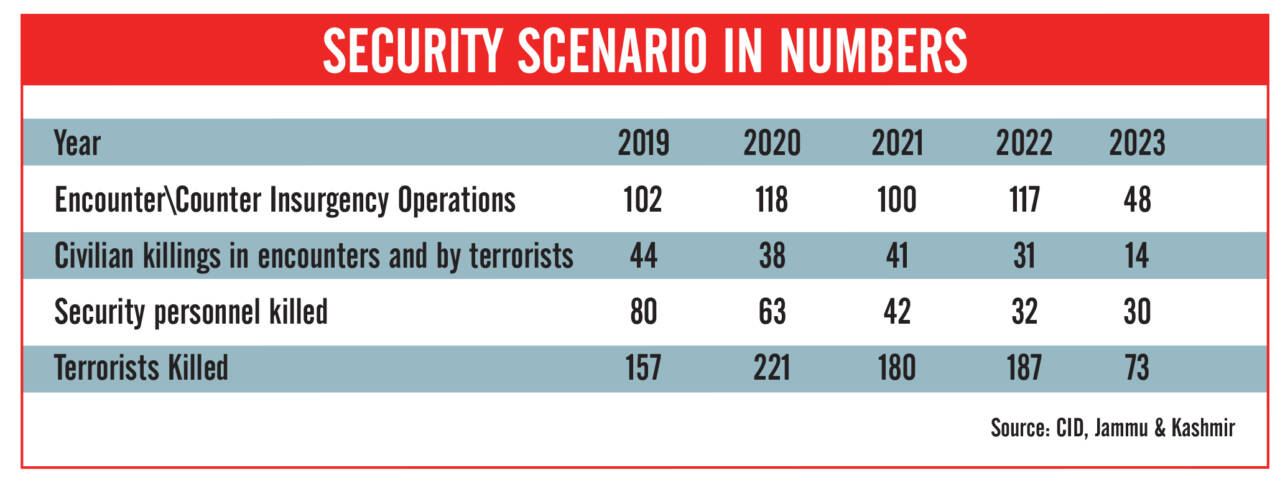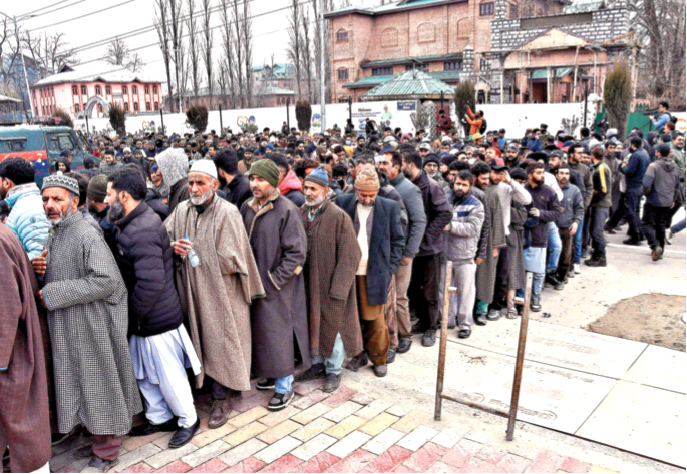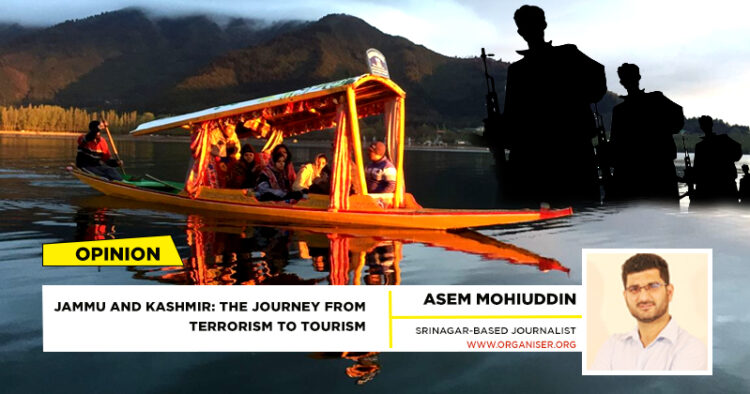Abdul Hamid, a retired Government official in Teetwal village of Kupwara district has renovated his ancestral home recently and is poised to convert it into the homestay for tourists. Hamid wants his son, who recently finished his post-graduation, to engage in this – what he terms as a ‘lucrative business’ opportunity in his village. “If he succeeds in running this homestay business, he will earn more in few years what I have earned throughout my career,” said he.
Teetwal is a zero-line village in North Kashmir’s Kupwara district. The Kishanganga river splits it with Chillana hamlet of Pakistan-occupied Jammu Kashmir (PoJK). Given the close proximity between the two sides, the village in recent times has witnessed an unprecedented tourist footfall after the Jammu & Kashmir Government decided to promote border tourism in the Union Territory. Village locals are attributing this transformation – from being the terrorists’ path to being a tourist attraction – to the prevailing peace on the Line of Control. Since the 1990s, hundreds of families had migrated to ‘safer areas’ because of frequent mortar shelling and unprovoked firing from Pakistan army to facilitate infiltration of terrorists.
A Pathway to Progress
The scenic beauty of J&K is matched only by its rich cultural heritage and historical significance. Yet, for years, inadequate infrastructure has hindered the region’s progress. However, recent strides in road development initiatives signal a promising shift towards connectivity and development in the region
- 1315 Pradhan Mantri Gram Sadak Yojana (PMGSY) schemes, resulting in the construction of 8787 kilometers of roads
- 206 schemes under the National Bank for Agriculture and Rural Development (NABARD) have been successfully completed
- One of the notable ongoing projects is the Delhi-Amritsar-Katra expressway, covering a distance of 135 kilometers within J&K
- Construction of the Semi Ring Road in Jammu and the Semi Ring Road in Baramulla, along with the double-laning of the Akhnoor-Poonch road
- Significant progress has been made in the healthcare sector. The establishment of AIIMS at Vijaypur and Awantipora, along with the operationalisation of seven new Government Medical Colleges
- Under the Pradhan Mantri Development Programme (PMDP), 33 projects, jointly funded by the Government of India and the Government of J&K, have been completed or are substantially completed
- The Ministry of Road Transport and Highways (MoRTH) has sanctioned the construction and upgradation of 294 major road and bridge projects at an estimated cost of Rs 24315 crores
“No one could have even dared to see with naked eyes on the other side. They would respond with mortar shells and snippers. So many people in early 1990s died and were injured after Pakistan army fired upon the civilian areas which forced us all to migrate from here, leaving everything behind,” said Iftikar Ahmad. Given the consistent infiltration attempts from PoJK backed by the Pakistan army, the Indian army had restricted civilian movement in the area, which lasted till 2019.
The situation, however, has significantly improved post Article 370 abrogation. Now, not only peace is prevailing along the LoC but the village is emerging as a hot destination for tourists. In this tiny village, there are already around 20 officially approved Home Stays and all of them have received advanced bookings for the current season. With these new employment opportunities for the residents of border villages, the dividends of peace are finally reaching the last person of the country.
Teetwal is not the only border village that is receiving tourists. There are dozens of villages close to the Line of Control that have recently been put on the tourism map by the J&K Tourism Development Corporation, therefore expanding the vistas of UT’s most progressive economic sector.
Not only the locals, even the tourists in these villages are now moving around fearlessly, even capturing the life on the other side in their cameras and mobile phones.
“There is no more fear or insecurity. We have freedom to go wherever we want,” the locals thank the central government for its efforts to restore peace on the borders.
Tourism is currently the second largest sector to contribute to the UT’s economy. The first sector is Horticulture, with an annual turnover of roughly Rs 15,000 crore.
In 2023, J&K’s tourism industry broke all records following the arrival of 2.11 crore tourists, including significant number of pilgrimage tourists. The Government is expecting that in 2024 the number may swell further owing to peace, tranquility and expansion of tourism-related infrastructure and its successful promotion across the globe. The three decades of Pakistan sponsored terrorism in Kashmir had wreaked havoc to its economy, especially the tourism sector. Post Article 370 abrogation, the sector is reviving with an active support from the Central Government.
Industrial and Corporate Growth
Besides tourism, other economic sectors are also showing positive indicators in J&K. In the last five years, as many as Rs 84,544 crore investment proposals were received by the J&K government under the new Industrial Policy of 2021. In just 3 years, the actual investment on ground stands at Rs 2518 crore.

While the people in J&K have been predominantly relying on government health facilities for their treatment, the last five years have seen many new private players foraying in the sector, offering choice and quality treatment to the people. Paras, Ujala are some of the prominent names in private sector while Apollo is setting up a 250-bed super specialty hospital in Jammu.
There has also been significant investment in retail and fast-food sector including Reliance, Big Bazar, VMarts, KFC, Dominos, PizzaHut etc. These companies were earlier facing lots of hardships for investments due to regressive laws accompanied by the security issues. The changes in business and investment laws besides zero tolerance towards terrorism have smoothly facilitated the arrival of top business houses in J&K, which in turn has generated lots of employment opportunities for the youth. Modi government’s commitment to zero tolerance towards terrorism over the years has transited J&K into a region blooming with not just economic opportunities but also remarkable infrastructural development.
Srinagar city, which had been crippling under its own weight following no expansion for decades, is not only being renovated with all basic and modern facilities but also transformed into a modern city with a massive investment of Rs 3,000 crore. This makeover of one of the oldest and historic cities of the country has turned it into a new attraction for tourists. Earlier, it had virtually turned into just a resting spot for tourists who visited picnic spots such as Gulmarg, Sonamarg, Pahalgham etc in the day time and returned to their hotel rooms in Srinagar to rest.
“The new look of the city, which is beautifully illuminated after sunset now, has offered an added opportunity for the locals to encash on tourism as a growing number of tourists prefer to walk around and explore the city markets, people, culture and daily life after returning from tourist spots. Srinagar city has come up with a lot of fun and activities in the last several years,” Mudasir, a travel agent in Srinagar said. Mudasir has never seen such a boom in the industry in his career that spans over for three decades.
Bollywood in Kashmir
The prevailing peace has rekindled Bollywood’s strained relations with Kashmir. Over 300 movies and web series have been shot in the UT in the last three years. From Shah Rukh Khan to John Abraham and to the recent visit of Emraan Hashmi in North Kashmir’s Baramulla town, all top Bollywood and Tollywood actors have been in Kashmir in last five years. Interestingly, John Abraham recently visited Kashmir to promote a fitness centre franchise in Srinagar, and roamed the streets with minimal security.

Hashmi, who visited Old Town Baramulla for the shooting of his upcoming movie – an area previously considered as the bastion of separatists – was garlanded by the local youth who took selfies with him, setting yet another example of ideological change in young minds.
Security Improvement
Economic growth and social security of people is possible only when there is peace and it was the security forces on ground who maintained it. The
Official figures show a steep decline in terrorism-related incidents in J&K while forced shutdowns, streets protests are things of the past. There was not a single protest reported anywhere in the UT in the last two years. The number of encounters between security forces and terrorists have also come down noticeably.
The twin police districts Sopore and Shopian, considered to be the hot-bed of terrorism, are not only peaceful now but headed by two young lady police chiefs who are becoming an inspiration for the youth. Sopore SP Divya D and Tanushree of Shopian not only engage with the youth of their respective districts, they have emerged as internet sensations for promoting tourism, peace and offering guidance to the youth to shape their future. Previous regimes would often consider muscle power to handle the situation in the districts and accordingly appoint tough police cops.
“The BJP analysed the Kashmir situation well before taking decisions. The party’s think tank knew that the problem doesn’t exist due to external support only but internally some mechanism is also working to keep the pot boiling. It has destroyed the entire eco system operating internally and externally and its stick and carrot policy is working,” says a political leader on condition of anonymity. Despite being a political opponent to the BJP, he endorses the change in situation and admits the BJP managed to bring peace in J&K. He, however, was unsure if it will last permanently.
As the peace on the ground has thrived, the social life of people and economy stabilising, the Government is mulling to withdraw the Armed Forces Special Powers Act (AFSPA) and troops in a phased manner. Union Defence Minister Rajnath Singh recently said that the Centre has formulated a 7-year blueprint for the withdrawal of troops, which sums up the overall improvement in the security situation of J&K. Rajnath Singh said this recently in an interview to a national news channel and left the decision to the Union Home Ministry. “The circumstances have become such that AFSPA can be removed but whatever action has to be taken in this regard will be taken by the Home Ministry,” he said.


















Comments